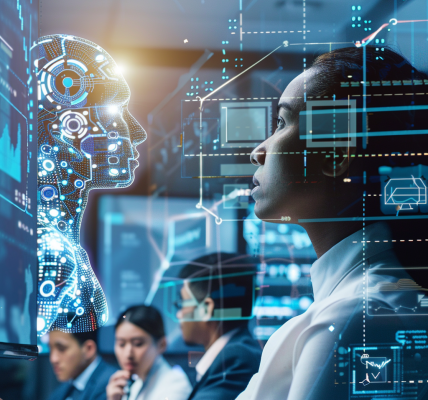AI Revolutionizes Industries: Transformations in Customer Service, Healthcare, and More
In recent developments, the world of technology has witnessed significant advancements that are reshaping various industries. The rapid evolution of artificial intelligence (AI) has become a focal point, driving innovation and enhancing efficiency across multiple sectors. Businesses are increasingly adopting AI-driven solutions to streamline operations, improve customer experiences, and gain competitive advantages.
One of the most notable trends is the integration of AI in customer service. Companies are utilizing chatbots and virtual assistants to handle inquiries, providing instant responses and freeing human agents to focus on more complex issues. This shift not only improves response times but also enhances customer satisfaction by offering 24/7 support.
Moreover, AI is making waves in the healthcare industry. From predictive analytics that assist in diagnosing diseases to personalized treatment plans tailored to individual patients, the impact of AI on healthcare is profound. Medical professionals are leveraging machine learning algorithms to analyze vast amounts of data, leading to more accurate diagnoses and better patient outcomes.
The finance sector is also experiencing a transformation due to AI technologies. Automated trading systems and risk assessment tools are becoming commonplace, allowing financial institutions to make informed decisions at unprecedented speeds. Additionally, AI is playing a crucial role in fraud detection, with algorithms capable of identifying unusual patterns and flagging potential threats in real-time.
Education is another area where AI is making a significant impact. Adaptive learning platforms are personalizing educational experiences for students, catering to their unique learning styles and paces. This approach not only enhances engagement but also improves learning outcomes, as students receive tailored support based on their individual needs.
As AI continues to evolve, ethical considerations are coming to the forefront. Issues surrounding data privacy, algorithmic bias, and the potential for job displacement are sparking debates among industry leaders and policymakers. Striking a balance between innovation and ethical responsibility is essential to ensure that the benefits of AI are realized without compromising societal values.
In the realm of cybersecurity, AI is emerging as a powerful ally. Organizations are employing AI-driven security solutions to detect and respond to threats more effectively. Machine learning algorithms can analyze network traffic patterns, identifying anomalies that may indicate a cyberattack, thus enabling quicker response times and minimizing potential damage.
Furthermore, the rise of remote work has accelerated the adoption of AI tools designed to enhance productivity and collaboration. Virtual collaboration platforms are integrating AI features to facilitate seamless communication and project management, allowing teams to work efficiently regardless of their physical location.
As industries continue to adapt to the changing landscape, the role of AI is expected to expand further. Research and development in this field are ongoing, with new applications and technologies emerging regularly. Companies that embrace AI innovations are likely to stay ahead of the curve, driving growth and success in an increasingly competitive market.
In conclusion, the integration of artificial intelligence across various sectors is transforming the way businesses operate and interact with customers. As the technology continues to advance, its implications will be far-reaching, paving the way for a future where AI plays an integral role in everyday life.





